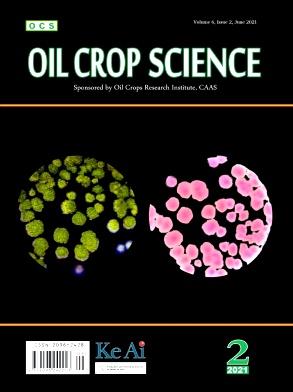Interactive effect of potassium and zinc application on oil yield of sunflower
Q3 Agricultural and Biological Sciences
引用次数: 0
Abstract
Several initiatives have been made in Egypt to increase the overall production of oil crops, especially sunflower and to close the gap between edible oil production and demand. Field experiments were conducted during the main seasons of 2022 and 2023 at the agricultural research station of National Research Centre, Nubaria, Egypt to investigate the effects of potassium nitrate (0, 20, 40, 60 kg K2O fed−1) (fed = feddan = 2.4 ha) and zinc sulfate (0, 25, 50, 75 ppm Zn) on growth, oil yield, nutrients components and chemical composition of sunflower. Results indicated that application of potassium nitrate has a promoted effect on chlorophyll content, growth parameters (Head weight, head diameter and 100 seed weight), protein content, oil yield as well as nutrient content under all applied levels. The data also showed that the highest significant increase occurred with the soil application of 40 kg fed−1 potassium nitrate combined with 75 ppm Zn foliar spray. Meanwhile, the lowest values were obtained at the control treatment. Therefore, the current study detected that potassium soil addition at 40 kg K2O fed−1, besides foliar application with 75 ppm Zn are important to improve the growth, macro-micronutrient, seeds and oil productivity of sunflower crops. Oil yield and nutrient content exhibit a strong positive correlation, with a correlation coefficient of 0.903 for N, 0.94 for P, 0.962 for K and 0.966 for Zn. This indicates that a higher nutrient percentage is associated with higher oil content of sunflower. Study underscores the importance of comprehending the interplay between potassium and zinc treatments in sunflower plants to enhance growth, yield, and oil production effectively. Understanding these relationships can lead to optimized cultivation practices and improved outcomes in sunflower farming.
钾锌互作对向日葵油料产量的影响
埃及采取了若干举措,以增加油料作物,特别是向日葵的总产量,并缩小食用油生产与需求之间的差距。在埃及努巴利亚国家研究中心农业研究站,于2022年和2023年主要季节进行田间试验,研究硝酸钾(0、20、40、60 kg K2O投喂−1)(投喂= feddan = 2.4 ha)和硫酸锌(0、25、50、75 ppm Zn)对向日葵生长、产油、营养成分和化学成分的影响。结果表明,在不同施用水平下,硝态钾对水稻叶绿素含量、生长参数(穗重、穗粗和百粒重)、蛋白质含量、产量和养分含量均有促进作用。结果还表明,施用40 kg - 1硝酸钾配以75 ppm Zn叶面喷施的土壤增产效果最显著。而对照处理则最低。因此,本研究发现,除叶面施用75 ppm Zn外,土壤添加40 kg K2O−1钾对向日葵作物的生长、常量微量元素、种子和产油能力都有重要的促进作用。油料产量与养分含量呈较强的正相关,氮、磷、钾、锌的相关系数分别为0.903、0.94、0.962和0.966。这说明向日葵的营养成分百分比越高,其含油量越高。研究强调了了解钾和锌处理对向日葵植株生长、产量和产油量有效促进的重要性。了解这些关系可以优化种植方法并改善向日葵种植的结果。
本文章由计算机程序翻译,如有差异,请以英文原文为准。
求助全文
约1分钟内获得全文
求助全文
来源期刊

Oil Crop Science
Food Science, Plant Science, Agronomy and Crop Science
CiteScore
3.40
自引率
0.00%
发文量
20
审稿时长
74 days
 求助内容:
求助内容: 应助结果提醒方式:
应助结果提醒方式:


